Educational innovators who wish to help lecturers bring about educational innovation with IT will find inspiration and decision aids here. A number of higher education institutions have investigated how they enable instructors to innovate their teaching.
5 choices for organising educational innovation
By comparing the cases, an image emerged of five different basic choices that need to be made when organising support. If you want to take educational innovation with IT to a higher level, it is wise to think about these choices and make them within your own institution. Or to enforce these choices within your institution.
Central innovation programme or standing organisation?
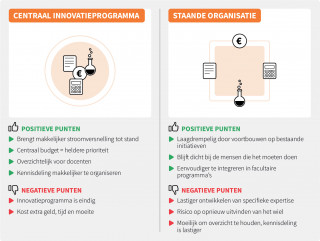
All the higher education institutions interviewed choose to set up a central programme. In doing so, they aim to accelerate educational innovation with the aid of IT. For an institution that is just starting out with educational innovation, a project-based approach is indispensable, in the opinion of all the institutions interviewed. A well-executed project or programme provides more opportunity to experiment, to find out what the instructors need, to respond flexibly to developments, and to expand quickly where necessary.
Bottom-up or top-down?
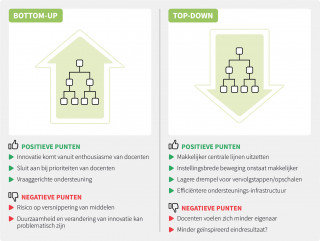
All the institutions interviewed believe that lecturers must retain ownership of their teaching. If you also want to improve education with the aid of IT, you will need to make every department aware of its added value. This means that lecturers must feel ownership of educational changes, that faculties must encourage lecturers to develop blended education, and that educational directors and managers must feel the need for innovation. Although the lead for redesigning a subject lies with the lecturer, not everyone is ready to take major steps. Reaching early adopters is not that difficult, but how do you get the masses moving? It is up to the institution how big the "interference" of deans, administrators and directors should be. Do you encourage educational innovation by supporting initiatives from below, do you impose from above that all programmes must engage in a redesign of the education system, or do you opt for a middle course?
Centralised or decentralised support?
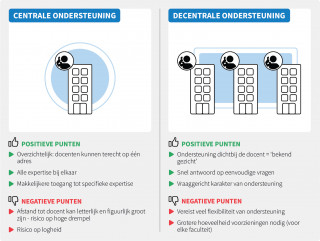
Four of the five institutions interviewed are currently working on centralisation. Various disciplines in the area of support and professionalisation are brought together in one centre. This involves, for example, professionalisation programmes, educational research, audiovisual support, physical space for experimentation, and knowledge-sharing initiatives. Each institution will need to decide whether teacher support is to be provided centrally or decentrally, or whether there is an interim solution.
Train or hire experts?
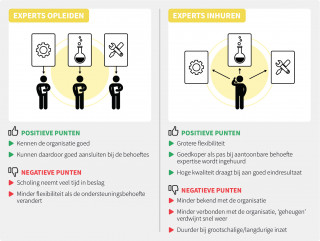
All the institutions interviewed put together multidisciplinary teams to innovate education with the aid of IT. In addition to instructors, a team may consist of educationalists, student assistants, e-learning developers, instructional designers, an animator, an editor, and a marketing professional. Institutions must ask themselves whether they have all the necessary expertise in house to achieve the desired level, or whether additional expertise is required. Which expertise is structurally necessary, which only occasionally? Do you train people for this, do you hire them from outside or do you hire them? Or are students with sufficient knowledge enough?
Seeing extra appreciation or educational innovation as part of the job description?
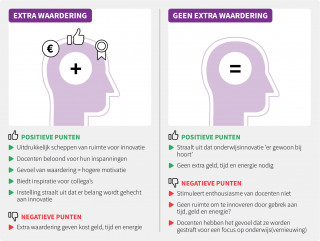
All the institutions interviewed want to organise educational innovation primarily by stimulating lecturers who are already working on it or wish to do so. In doing so, they hope that enthusiasm for educational innovation will spread like an oil slick. This appreciation of educational innovation is essential if the large group of more conservative lecturers are to be included. For lecturers, this appreciation can take various forms:
- more salary
- more time to redesign their teaching
- more attention for their achievements
- interest from peers
- appreciation from students
- positive influence on their career
Appreciation also means that failed experiments are not punished. Each institution will have to ask itself whether educational innovation is appreciated within its own institution. It is of course also possible that an institution does not reward educational innovation because it regards it as a normal part of the lecturer's job.
